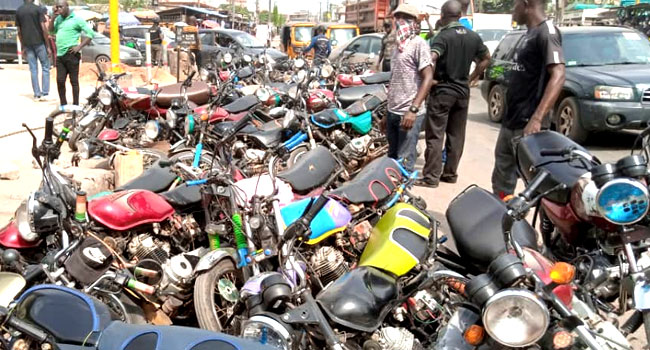The use of motorcycles, popularly known as okada, achaba etc in different parts of the country, as a means of transportation in Nigeria, is now widely spread that there is hardly any locality that is left out.
Motorcycles became common as a means of transportation in the early 80s following the economic meltdown in Nigeria which necessitated the introduction of stringent fiscal measures by the government.
This development came in handy as it served as a cheaper means of public transportation, as well as a means of easily reaching difficult terrains which the conventional motor vehicles cannot assess.
Folks who hitherto, could not afford vehicles or who with the unfolding economic realities, could no longer sustain ownership of motor vehicles, had a ready fall back in okada ownership.
Many hitherto unemployed people have also found relief in the ownership/operation of commercial motorcycles as it has provided employment to millions of Nigerians.
Nonetheless, this development has also brought with it a lot of challenges to the society in terms of insecurity, road traffic crashes etc.
This has necessitated the governments at various levels to check their operations, as many state governments have banned their operations especially in the urban areas.
And in a bid to curtail the excesses of these okada operators, law enforcement officers have been involved in violent clashes with them, and in many cases, resulting in severe injuries and at times, death.
Recently in Lagos, a paramilitary officer attached to the Lagos State Environmental and Special Offences Unit (task force), Monday John, was killed during an attack on the agency around the Kara bridge area on the Lagos-Ibadan Expressway, Ogun State.
PUNCH Metro gathered that the task force officials had gone to a destination in Lagos to carry out enforcement on motorcyclists plying the highway. During the exercise, the officials reportedly impounded some motorcycles and put them in their operational truck and left.
In a bid to recover their seized property, the aggrieved motorcyclists reportedly mobilised, boarded a bus and chased the task force team. This led to the killing of the officer.
It would be recalled that in September last year, a senior police officer was also killed when a team of law enforcement officers went on a raid of okada riders who were allegedly operating in areas they are prohibited from.
Our advice to governments is that aside the continued raiding and arrests, they should also make serious efforts to make the operation of these okadas unattractive to commuters. This is because the average commuter uses okada because there are no readily available means of better alternative means of moving.
The okada riders should be better organized by government against what is obtainable nowadays whereby the local governments and transport associations are more interested in the fees collected from these operators.













